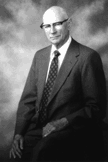
[left, Charles P. Roland]
Is a short story masterpiece harder to write than a good novel? You can certainly make a case, however arbitrarily one rates different forms of fiction. The same holds true for non-fiction, to a certain degree. Of course there's no substitute for prodigious works of research that aim to comprehensively cover a particular subject, or era. But at some point they are no harder to write than a shorter work, only more time-consuming, or more demanding of sustained, single-minded devotion. Crafting a narrative of solidly concise prose in non-fiction is not only highly valued in historical texts, it is a talent generally sought (if rarely found) in professional communications from journalism to corporate memoranda. Done right, less is more. Done wrong, it's just less.
I was given pause (extended, hair-pulling pause) to chew on these things while working on the Library of Congress Civil War Desk Reference. I composed first drafts for dozens of sidebars and short essays on everything from Commerce Raiders, and Civil War era Photography, to the Federal Ambulance Corps and the Emancipation Proclamation. To do justice to any of these topics in a few hundred words — finding the essence, or the kernel that casual readers would take away and that students of the subject would find meaningful — felt more challenging than writing 3,000 words on each, when the constant urge to digress and qualify is easily satisfied. Every cut in the rewriting process subtly shifts the emphasis. Every clarifying fix necessitates trimming another bulge elsewhere. Which brings me to the subject of single-volume histories of the war.
I own and have enjoyed the two best, single-volume studies, James McPherson's incomparable Battle Cry of Freedom, for which Oxford Press recently brought out a spectacular illustrated edition, and David Eicher's military-oriented The Longest Night. Both are notable accomplishments. But what about brief, single-volume histories of the war? That's where the painful editing comes in, and where the author's instincts and judgments are on display in every paragraph. That's where we gain a sense of the author's mettle, and learn whether the author has mastered the art of knowing when to shut the hell up. The Civil War is a long story. So few among us know how to make a long story short.
I think I read the National Geographic volume that one used to see around in battlefield park bookshops, and used bookstores — I remember having it in my hands night after night, I just can't remember reading it (mainly, I remember people complaining that the cavalryman pictured on the front cover was from the wrong era). I also read, a long time ago, Fletcher Pratt's Short History of the Civil War (originally released as Ordeal by Fire). Flipping through it again recently I see how dated it is, though the relaxed style of the narrative is sometimes gripping, and always engaging. It dates to the 30's, and so I am reflexively, and perhaps unfairly, suspicious about the level of scholarship, and turned off by the free and generous use of unattributed quotes. Not to disparage Mr. Pratt — the Fletcher Pratt award by the Civil War Round Table of New York is appropriately prestigious in Civil War book circles.
But, the brief history of the war that I always come back to, and that I unhesitatingly recommend to anyone looking for an outstanding introduction, is Charles P. Roland's, An American Iliad (University Press of Kentucky, 1991). At 289 pages, it's roughly a third the length of Eicher's and McPherson's works, but packs a punch. Roland's volume is a synthesis of the best writing on the subject, and his talent for condensing that scholarship into a graceful narrative — covering the build-up to the war, and wartime politics, as well as military events in all major theaters, while profiling principal figures — is a thing to behold. It's invigorating to read the saga of the Civil War in a brilliantly paced distillation over the course of a handful of sittings. Unlike the campaign studies and biographies that occupy so much of our time, a single volume narrative like Roland's brings the broad scope of the war back into focus, like a reliable wide-angle lens that still allows for sharp detail in the foreground.
An American Iliad does not have notes, only a well-considered bibliographic essay at the end. Roland's experience — his lifetime of researching, writing, and teaching — translates into an authoritative, objective delivery that leaves readers untroubled by the absence of specific documentation. His work has held up in the face of critical scrutiny, and that makes all the difference. I sat next to Professor Roland at dinner one evening during a Civil War Round Table Associates conference, and was very taken by his friendly, unpretentious demeanor. He was smart and humble, and seemed genuinely honored to be asked to speak to our small assemblage. Many years later I came across more information on his life, which looks like it makes for an interesting story in its own right. Next time some non-Civil War type or student asks you for a recommendation, don't start them off on such a daunting assignment as Foote's trilogy, or one of the hefty tomes mentioned above. Send them to Roland, and they'll wonder why they haven't already read more of this endlessly fascinating story.
-- discussion of this posting can be joined here.
No comments:
Post a Comment